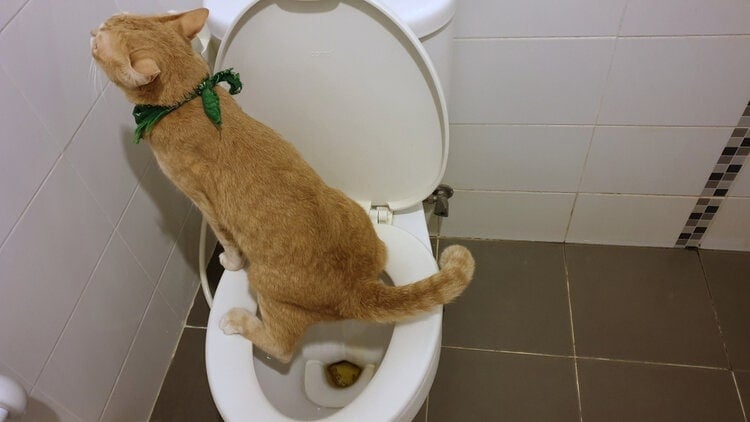Do you find yourself searching for information and facts about Don’t flush cat feces down the toilet?

Intro
As cat proprietors, it's essential to bear in mind how we throw away our feline pals' waste. While it might seem practical to purge feline poop down the bathroom, this technique can have damaging repercussions for both the environment and human health.
Ecological Impact
Purging cat poop presents hazardous virus and bloodsuckers right into the water, posturing a substantial danger to aquatic ecosystems. These contaminants can negatively affect aquatic life and compromise water quality.
Wellness Risks
In addition to environmental problems, flushing pet cat waste can also position health and wellness dangers to humans. Pet cat feces might contain Toxoplasma gondii, a bloodsucker that can trigger toxoplasmosis-- a possibly extreme illness, especially for pregnant women and people with weakened body immune systems.
Alternatives to Flushing
Luckily, there are safer and a lot more liable methods to throw away pet cat poop. Take into consideration the following alternatives:
1. Scoop and Dispose in Trash
One of the most typical approach of dealing with feline poop is to scoop it into a naturally degradable bag and throw it in the garbage. Make sure to use a committed litter inside story and get rid of the waste immediately.
2. Usage Biodegradable Litter
Go with biodegradable cat trash made from products such as corn or wheat. These litters are environmentally friendly and can be securely taken care of in the trash.
3. Hide in the Yard
If you have a backyard, consider hiding feline waste in a marked area away from vegetable gardens and water resources. Make certain to dig deep adequate to stop contamination of groundwater.
4. Set Up a Pet Waste Disposal System
Buy an animal waste disposal system particularly developed for cat waste. These systems use enzymes to break down the waste, decreasing smell and environmental influence.
Verdict
Liable pet ownership extends beyond giving food and shelter-- it likewise includes proper waste administration. By avoiding flushing cat poop down the toilet and choosing alternate disposal methods, we can minimize our environmental impact and shield human wellness.
Why Can’t I Flush Cat Poop?
It Spreads a Parasite
Cats are frequently infected with a parasite called toxoplasma gondii. The parasite causes an infection called toxoplasmosis. It is usually harmless to cats. The parasite only uses cat poop as a host for its eggs. Otherwise, the cat’s immune system usually keeps the infection at low enough levels to maintain its own health. But it does not stop the develop of eggs. These eggs are tiny and surprisingly tough. They may survive for a year before they begin to grow. But that’s the problem.
Our wastewater system is not designed to deal with toxoplasmosis eggs. Instead, most eggs will flush from your toilet into sewers and wastewater management plants. After the sewage is treated for many other harmful things in it, it is typically released into local rivers, lakes, or oceans. Here, the toxoplasmosis eggs can find new hosts, including starfish, crabs, otters, and many other wildlife. For many, this is a significant risk to their health. Toxoplasmosis can also end up infecting water sources that are important for agriculture, which means our deer, pigs, and sheep can get infected too.
Is There Risk to Humans?
There can be a risk to human life from flushing cat poop down the toilet. If you do so, the parasites from your cat’s poop can end up in shellfish, game animals, or livestock. If this meat is then served raw or undercooked, the people who eat it can get sick.
In fact, according to the CDC, 40 million people in the United States are infected with toxoplasma gondii. They get it from exposure to infected seafood, or from some kind of cat poop contamination, like drinking from a stream that is contaminated or touching anything that has come into contact with cat poop. That includes just cleaning a cat litter box.
Most people who get infected with these parasites will not develop any symptoms. However, for pregnant women or for those with compromised immune systems, the parasite can cause severe health problems.
How to Handle Cat Poop
The best way to handle cat poop is actually to clean the box more often. The eggs that the parasite sheds will not become active until one to five days after the cat poops. That means that if you clean daily, you’re much less likely to come into direct contact with infectious eggs.
That said, always dispose of cat poop in the garbage and not down the toilet. Wash your hands before and after you clean the litter box, and bring the bag of poop right outside to your garbage bins.
https://trenchlesssolutionsusa.com/why-cant-i-flush-cat-poop/

Hopefully you enjoyed our post about How to Dispose of Cat Poop and Litter Without Plastic Bags. Thanks a ton for finding the time to read our posting. For those who appreciated our blog post plz don't forget to pass it around. I treasure reading our article about How to Dispose of Cat Poop and Litter Without Plastic Bags.
Book Now